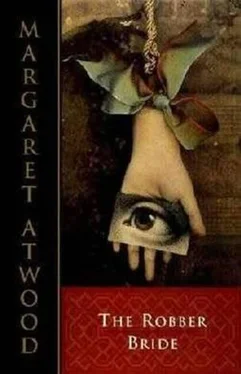Although she couldn’t see it clearly, she thinks she knows who that person was. It was Karen, who was left behind somehow; who stayed hidden in Zenia’s room; who waited until Zenia had opened the door onto the balcony and then came up behind her and shoved her off. Karen has murdered Zenia, and it’s Charis’s fault for holding Karen away, separate from herself, for trying to keep her outside, for not taking her in, and Charis’s tears are tears of guilt.
That is just one way of putting it, of course. What Charis means, she explains to herself, is that she wished Zenia dead. And now Zenia is dead. A spiritual act and a physical one are the same, from the moral point of view. Karen-Charis is a murderer. She has blood on her hands. She’s unclean.
They go in Roz’s car, the smaller one. There is some delay while Roz tries to find someone to park the car; as Roz complains to the man who is finally provided, the Arnold Garden is not exactly Johnny-on-the-spot when it comes to service. Then the three of them walk into the lobby. Charis has pulled herself together by now, and Tony has a steadying hand on her arm. “She’s in the fountain,” Charis whispers.
“Shh,” says Tony. “We’ll see in a minute. Let Roz do the talking.”
“I was here this afternoon, checking out your hotel as a convention possibility, and I think I left my gloves,” says Roz. She’s decided it would he a mistake to say they are looking for Zenia, on the outside chance that Charis may be right; not that Roz believes it for an instant, but still. Anyway, if they call the room and there’s no answer, what would it prove? Nothing about death. Zenia could have checked out.
“Who were you talking to?” says the woman behind the counter.
“Oh, this was just preliminary,” says Roz. “I think I left them out there in the courtyard. On the edge of the fountain:”
“We keep that door locked at this time of year,” says the woman.
“Well, it wasn’t locked this afternoon,” says Roz belligerently, “so I just had a look around. It’s such a nice patio for cocktails, out by the fountain, is what I thought. That would be in June. Here’s my card:’
The card has an improving effect. “All right, Ms. Andrews, I’ll have that unlocked for you right away,” says the woman. “As a matter of fact we often use it for cocktails. We could do a buffet lunch out there for you, too; in the summer there’s tables:” She motions to the concierge.
“And could you have the outside lights turned on?” says Roz. “I might have dropped my gloves in the fountain. Or they could’ve blown in:”
Roz’s idea is to have the whole place lit up like a Christmas tree so Charis will be able to see as plain as day that Zenia is nowhere in view. The three of them go out through the glass patio door and stand together, waiting for illumination. “It’s all right, honey, there’s nothing,” Roz whispers to Charis.
But when the lights go on, big floodlights from above and also from under the water, there is Zenia, floating face down among the dead leaves, her hair spread out like seaweed.
“My God,” Tony whispers. Roz stifles a scream. Charis doesn’t make a sound. Time has folded in upon itself, the prophecy has come true. But there are no dogs. Then it comes to her. We are the dogs, licking her blood. In the courtyard, the Jezebel blood. She thinks she is going to be sick.
“Don’t touch her,” says Tony, but Charis needs to. She reaches forward, reaches down and tugs, and Zenia revolves slowly, and looks straight at them with her white mermaid eyes.
Lv
She isn’t really looking though, because she can’t. Her eyes are rolled back into her head: that’s why they’re blank, like fish eyes. She’s been dead for several hours, or at least that’s what the police say when they arrive.
The hotel people are very worried. A dead woman in their fountain is not the kind of publicity they need, especially with business down the way it is. They seem to think it’s all Roz’s fault for suggesting that the lights be turned on, as if this is what caused Zenia to materialize in the fountain. But as Roz points out to the concierge, daylight would have been worse: hotel guests would be having breakfast in their rooms, going out, on the balcony for a little fresh air and a cigarette, looking down, and you can imagine the uproar then.
Because they were the ones who found the body, Tony and Roz and Charis have to wait around. They have to answer questions. Roz grabs hold of the conversation and quickly sticks in her story about the gloves; it would not be at all wise to tell the police that they’d rushed over to the Arnold Garden Hotel because Charis saw a vision while staring into a candle. Roz has read enough detective novels to know that such a story would immediately cast suspicion on Charis. Not only would the police think she’s a nutbar—well, objectively speaking, Roz can see it—but they’d also think she’s a nutbar capable of shoving Zenia off the balcony herself, and then having amnesia, followed by an attack of psychedelic vision-producing guilt.
At the back of Roz’s mind there’s a sliver of suspicion: maybe they’d be right. There was enough time for Charis to come back to the hotel before turning up at the Toxique for dinner. She could have done it. So could Tony, who has been frank about her murderous intentions. So could Roz herself, for that matter. No doubt the fingerprints of the three of them are all over the room.
Maybe it was someone they don’t even know, some stranger, one of those pursuing gunrunners or whatever, in that yarn Zenia fobbed off on Tony. But Roz doesn’t credit that. Instead, there’s a worse possibility, much worse: it might have been Larry. If what Zenia said was true, he would have had a good motive.
He was never a violent child, he would walk away from the other kids rather than argue; but Zenia could have threatened him in some way. She could have tried to blackmail him. He could have been on drugs. What does Roz really know about Larry, now that he’s grown up? She needs to get home as soon as possible and find out what he’s been up to.
Tony has dragged Charis off to one side to keep her out of harm’s way. She just hopes Charis will shut up about her vision, which—Tony has to admit—was accurate enough, though somewhat after the fact. But what really happened? Tony counts the possibilities: Zenia fell, Zenia jumped, Zenia was pushed. Accident, suicide, murder. Tony inclines towards the third: Zenia was killed—surely—by person or persons unknown. Tony’s glad she took her gun home, in case there are bullet holes, although she didn’t see any. She doesn’t think Charis could have done it, because Charis wouldn’t hurt a fly—it being her belief that flies might be inhabited by someone related to you in a previous life—but she’s not that sure about Roz. Roz has a temper, and can be impetuous.
“Did anyone know this woman?” says the policeman. The three of them glance at one another. “Yes,” says Tony. “We all came to see her, earlier today,” says Roz.
Charis starts to cry. “We were her best friends,” she says. Which, thinks Tony, is news to her. But it will have to do for now.
Roz drives Charis to the ferry terminal, and then she drives Tony home. Tony goes up the stairs to West’s study, where he’s plugged into two of his machines via the earphones. She turns off his switch.
“Did Zenia.call here?” she says. “What?” says West. ‘Tony, what is it?”
“This is important,” says Tony. She knows she’s sounding fierce but she can’t help it. “Have you been talking to Zenia?
Has she been here?” She finds the idea of Zenia rolling around on the carpet with West among the synthesizers highly distasteful. No: unbearable.
Читать дальше












